We may not have the course you’re looking for. If you enquire or give us a call on +91-181-5047001 and speak to our training experts, we may still be able to help with your training requirements.
Training Outcomes Within Your Budget!
We ensure quality, budget-alignment, and timely delivery by our expert instructors.
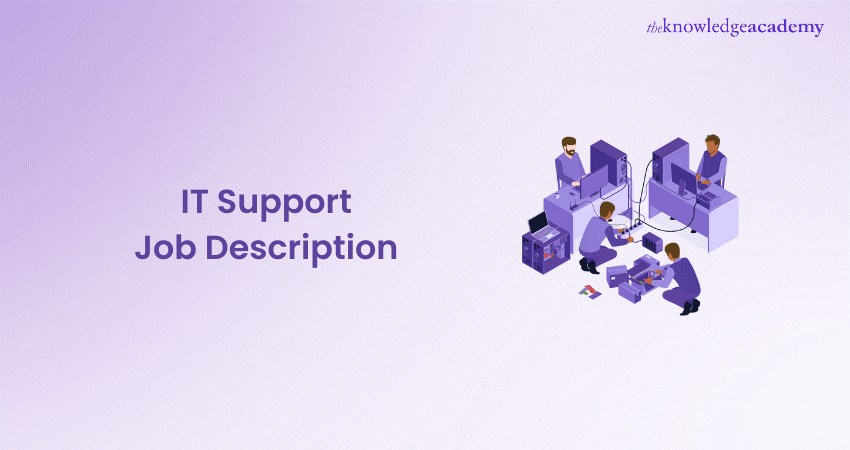
What exactly does an IT Support Job Description entail? Think of it as the comprehensive blueprint for keeping an organisation's technology running effortlessly. IT Support professionals are crucial in maintaining and troubleshooting computer systems and networks, ensuring minimal downtime and maximum productivity.
But there's more to IT Support than just technical wizardry. It’s about excellent communication and top-notch customer service. These professionals must understand users' needs, provide clear solutions, and build trust. This combination not only resolves issues but also enhances overall workplace productivity. Join us as we explore the IT Support Job Description, highlighting key responsibilities, essential skills, and salary expectations.
Table of Contents
1) What does IT Support do?
2) Responsibilities of an IT Support role
3) Skills and qualifications for IT Support
4) Examples of IT Support Job Description
5) Factor affecting IT Support professionals’ salary
6) Conclusion
What does IT Support do?
IT support professionals are essential problem solvers, serving as the go-to experts when technology fails. Their major role is to maintain and troubleshoot computer systems and networks within an organisation, ensuring smooth and efficient operations.
IT Support professionals handle everything, including hardware and software installation to system performance monitoring. They reduce interruption and increase production by providing technical support, ensuring that all technological components work together smoothly and effectively.
Day-to-day activities
The daily activities of an IT Support professional can change widely based on the size and nature of the organisation. However, some common tasks include installing and configuring computer hardware, software, systems, networks, printers, and scanners. They are also responsible for monitoring and maintaining computer systems and networks.
Types of IT Support roles
IT Support roles can be categorised into different types, each with specific responsibilities. These include:
1) Help desk support: The first point of contact for users experiencing issues.
2) Desktop support: Focuses on resolving issues related to desktop computers.
3) Network support: Manages and troubleshoots network-related problems.
4) Application support: Deals with software applications and their related issues.
Responsibilities of an IT Support role
IT Support roles come with a wide range of responsibilities, ensuring the effortless operation of an organisation's IT infrastructure. Following are the key duties they perform:
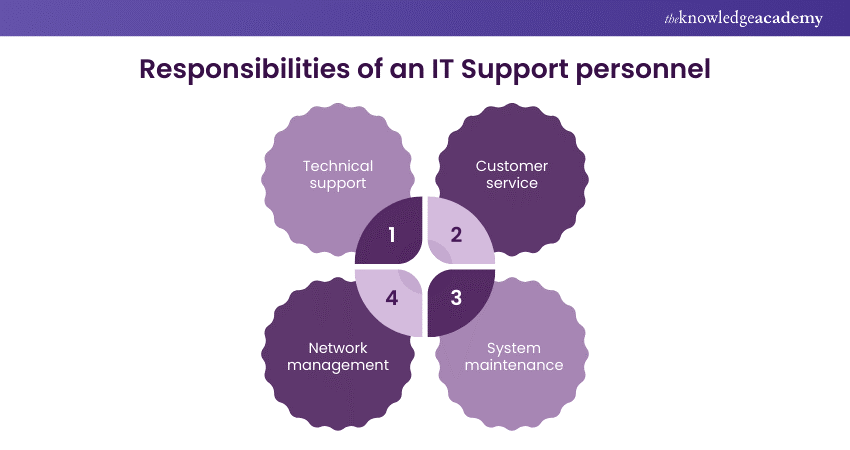
1) Technical support
Providing technical support is a fundamental aspect of an IT Support job. This includes diagnosing both hardware and software problems, identifying issues quickly, and implementing effective solutions. IT Support professionals are responsible for replacing faulty components, such as damaged hard drives or malfunctioning RAM.
They confirm that the network facilities which includes routers, switches, and firewalls, works properly in order to maintain uninterrupted connectivity. This helps to prevent network failures and makes sure all connected devices communicate effectively.
Additionally, they must stay updated on the new technological advancements to troubleshoot and resolve new and emerging issues efficiently. This proactive approach make sure minimal disruption to the organisation's operations, allowing for continuous productivity and smooth technological integration.
2) Customer service
Excellent customer service skills are essential for IT support professionals. They must connect effectively with users, listen to their issues, and understand their problems. This involves offering clear, concise solutions that people will understand, no matter their technical background.
Establishing trust with users, remaining patient, and maintaining a professional approach are all necessary. Good customer service makes customers feel supported and valued, which may improve overall happiness and efficiency in a company.
Fast and polite responses also assist the IT Support team in establishing confidence and a great reputation. Effective communication and timely support can greatly improve the user experience, resulting in a more efficient and peaceful work environment.
3) System maintenance
System and network maintenance should be performed on a regular basis to avoid problems before they arise. This includes doing frequent software upgrades to keep all programmes and Operating Systems current and secure. Keeping software up to date helps defend against vulnerabilities while also ensuring that users have access to the latest and most recent features and upgrades.
Routine backups are important for protecting against data loss in the case of hardware failures or cyberattacks. Backups ensure that essential data is quickly restored, reducing interruption and loss. This is particularly important for ensuring business continuity and protecting sensitive data.
Monitoring system performance enables IT Support staff to detect possible problems early on and take preventive steps. Regular health checks find deviations, improve performance, prevent problems from getting worse, ensure stability, decrease interruptions, and improve productivity.
4) Network management
Managing an organisation's network involves several critical tasks. IT Support professionals set up user accounts, permissions, and passwords to control access and ensure security. This setup helps in defining who can access what resources, thereby maintaining a secure and organised network environment.
They implement and maintain Network Security measures, like firewalls, to protect against cyber threats. Regular updates and security patches are important to defend against vulnerabilities and ensure the network remains robust against potential attacks.
Troubleshooting network connectivity issues is a key responsibility, requiring a thorough understanding of network protocols and configurations. Ensuring a reliable and secure network enables smooth communication and data transfer, which is essential for daily operations and long-term success.
Enhance your IT skills with comprehensive IT Fundamentals Training!
Skills and qualifications for IT Support
A successful IT Support professional needs a blend of technical skills, soft skills, and relevant educational qualifications. The following are the key attributes required:
Technical skills
An IT Support profession depends heavily on technical expertise. These include expertise in Operating Systems (Windows, macOS, and Linux), knowledge of networking protocols, and familiarity with hardware. IT Support specialists have to identify and deal with technical difficulties, configure software and hardware, and understand the complexities of network configurations.
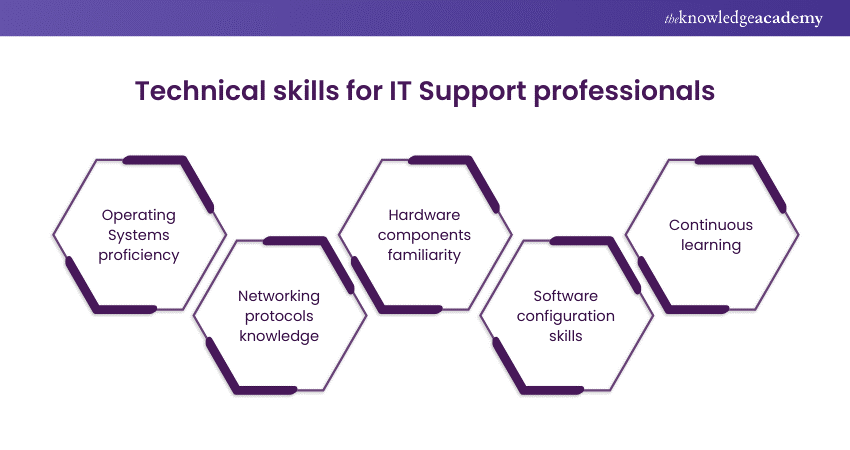
Maintaining their expertise requires continuous learning and staying up to date on the most recent technology advances. As technology advances at a quick pace, IT Support staff must stay updated in order to face new difficulties. This ensures that they provide the best possible service to their organisations.
Soft skills
Soft skills like problem-solving, communication, and time management are equally important. IT Support specialists who are skilled in problem-solving may successfully troubleshoot difficulties and find quick, practical solutions. These skills are essential for understanding the root cause of technological issues and quickly implementing effective solutions.
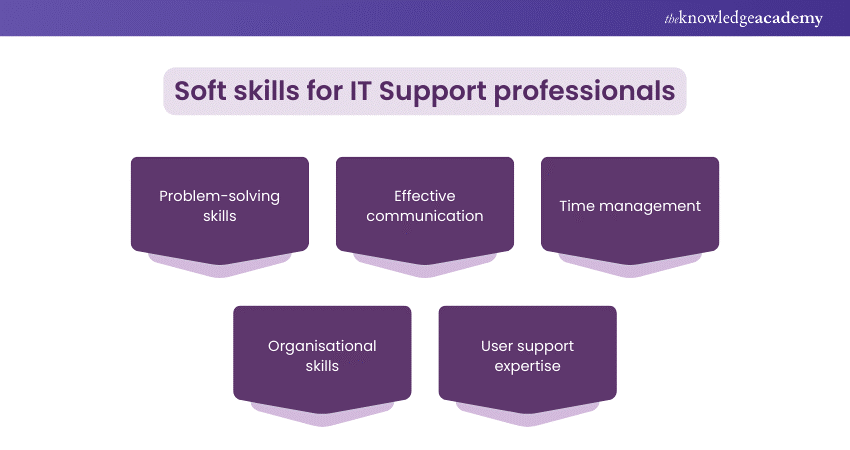
Strong communication skills are necessary for addressing technical problems and solutions for users who do not have a technical background. Time management and organisational skills assist in work prioritisation and simultaneously handling various difficulties, resulting in effective and timely support.
Educational requirements
While some IT Support roles may require only a high school diploma, others might need a bachelor's degree. Entry-level positions often provide on-the-job training, allowing individuals to gain practical experience quickly. A higher education degree offers a deeper understanding of complex IT concepts. This can make candidates more competitive in the job market.
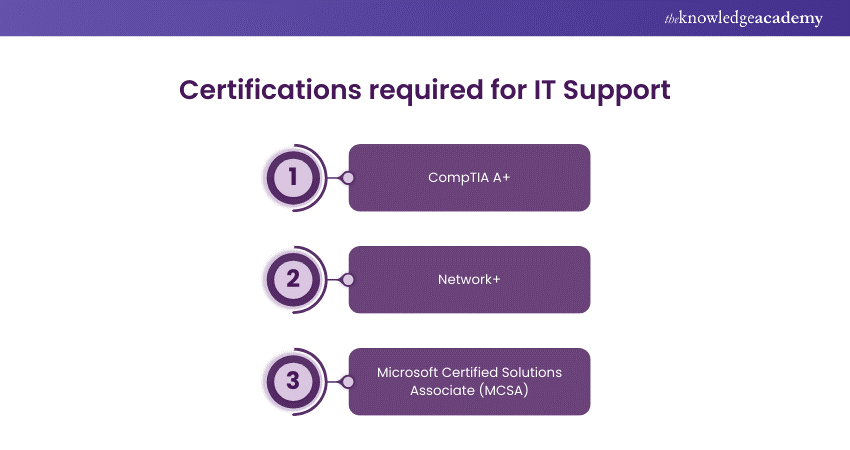
Certifications such as CompTIA A+, Network+, and Microsoft Certified Solutions Associate (MCSA) can also be beneficial, as they offer official proof of an individual's skills and expertise. These qualifications not only enhance an IT Support professional's trust but also improve their chances for employment and opportunities for development in the field.
Upgrade your security management expertise with our Security Management, Planning, And Asset Protection Training!
Examples of IT Support Job Description
Following are the examples of IT Support Job Description
Sample 1:
|
Position Title: IT Support Specialist Location: Salary: Job Type: Full-time, Permanent About the Role: We are seeking a dedicated IT Support Specialist to join our dynamic IT team. The qualified candidate will be responsible for offering technical support to our employees, by making sure the operation of our IT systems is smooth and efficient. Key responsibilities: 1) Technical support: Diagnose and resolve hardware, software, and network issues. 2) Customer service: Communicate effectively with users to understand and address their IT-related problems. 3) System maintenance: Perform regular maintenance, including software updates and backups. 4) Network management: Set up user accounts, manage permissions, and troubleshoot network connectivity issues. 5) Documentation: Maintain accurate records of issues and resolutions in the ticketing system. 6) Training: Provide training to users on new systems and software. Skills and qualifications: 1) Educational background: Bachelor's degree in Computer Science or a related field is preferred. 2) Experience: Minimum of 2 years in a similar IT Support role. 3) Technical skills: Proficiency in Windows and Mac OS, network management, and troubleshooting. 4) Certifications: CompTIA A+, Network+, or equivalent certifications are a plus. 5) Soft skills: Excellent communication, problem-solving, and customer service skills. What we offer: 1) Competitive salary and benefits package. 2) Opportunities for professional development and career advancement. 3) A collaborative and supportive work environment. 4) Access to the latest technology and tools. How to apply: Interested candidates are invited to send their CV and a cover letter detailing their relevant experience and qualifications to [email address] by [application deadline]. |
Sample 2:
|
Job Title: IT Support Engineer Overview: We are seeking a dedicated IT Support Engineer to join our growing team. The perfect candidate will be responsible for providing technical support and maintenance across our IT infrastructure, ensuring optimal performance and user satisfaction. Key duties and responsibilities: 1) Technical support: Offer timely and effective technical support to end-users, resolving hardware and software issues. 2) System administration: Perform regular system checks, updates, and backups, maintaining system integrity and security. 3) Network management: Configure and troubleshoot network issues, ensuring reliable and secure network connectivity. 4) Incident management: Log and manage incidents using our IT service management tool, escalating issues when necessary. 5) User training: Educate users on best practices and new technologies to enhance their IT literacy and productivity. 6) Documentation: Maintain comprehensive documentation of IT procedures, solutions, and configurations. Skills and qualifications: 1) Education: A degree in Information Technology or a related field is preferred. 2) Experience: 1-3 years of experience in IT Support or a related role. 3) Technical Skills: Proficiency in Windows, macOS, and Linux Operating Systems; knowledge of network protocols and configurations. 4) Certifications: CompTIA A+, Network+, or Microsoft Certified Solutions Associate certifications are beneficial. 5) Soft Skills: Strong problem-solving abilities, excellent communication skills, and a customer-focused approach. Benefits: 1) Competitive salary with opportunities for growth and development. 2) Comprehensive health insurance and pension plan. 3) Professional development opportunities, including training and certifications. 4) Flexible working hours and a beneficial work environment. How to apply: To apply, please send your CV and a cover letter explaining your suitability for the role to [email address] by [application deadline]. |
Factor affecting IT Support professionals’ salary
Following are the factors which affect IT Support salary
IT Support salary based on location
The below table shows the average annual salaries for different countries in the field of IT Support.
|
Location |
Annual Salary |
|
UK |
£25,000 - £35,000 |
|
India |
₹300,000 - ₹600,000 |
|
Australia |
AU$55,000 - AU$75,000 |
|
USA |
$45,000 - $65,000 |
|
UAE |
AED 100,000 - AED 150,000 |
|
Canada |
CA$50,000 - CA$70,000 |
|
Singapore |
S$40,000 - S$60,000 |
Source: Glassdoor
United Kingdom (UK):
In the UK, IT Support professionals earn between £25,000 and £35,000 annually. This range shows the varying levels of experience and specialisation within the field. IT Support roles are crucial in maintaining an organisation's technological infrastructure, ensuring efficient operations and prompt resolution of technical issues.
India:
In India, IT Support salaries range from ₹300,000 to ₹600,000 per year. The salary variance depends on factors like experience, industry, and specific technical skills. IT Support roles are in high demand, given the rapid growth of the tech industry and the increasing reliance on IT services across various sectors.
Australia:
Australian IT Support professionals can expect annual salaries between AU$55,000 and AU$75,000. The demand for skilled IT Support staff is robust and driven by the continuous advancement in technology and the need for reliable IT infrastructure in businesses. The higher end of the salary range usually requires extensive experience and specialised skills.
United States of America (USA):
In the USA, IT Support roles offer annual salaries ranging from $45,000 to $65,000. These positions are important for ensuring the smooth operation of computer systems and networks. Salaries vary based on experience, certifications, and the complexity of the IT environment managed.
United Arab Emirates (UAE):
IT Support professionals in the UAE earn between AED 100,000 and AED 150,000 annually. The IT sector is growing rapidly, with a strong focus on technology innovation and digital transformation. This salary range reflects the demand for skilled professionals who can support and maintain advanced IT systems.
Canada:
In Canada, IT Support salaries range from CA$50,000 to CA$70,000 per year. The Canadian tech industry is expanding, with increasing opportunities for IT Support roles across various sectors. Salaries depend on experience, technical expertise, and the specific needs of the employer.
Singapore:
IT Support professionals in Singapore earn between S$40,000 and S$60,000 annually. Singapore's robust IT sector and its position as a global technology hub drive the demand for skilled IT Support staff. The salary range reflects the value placed on maintaining reliable and efficient IT systems in businesses.
IT Support salary based on experience level
This following table outlines the average annual salaries in GBP for different experience levels in the field of IT Support.
|
Experience Level |
Annual Average Salary (GBP) |
|
Entry-level |
£30,000 - £40,000 |
|
Mid-level (junior) |
£40,000 - £60,000 |
|
Mid-senior-level |
£38,315 (median) |
|
Experienced level |
£80,000+ |
Source: Glassdoor
Entry-level:
Entry-level IT Support roles offer salaries ranging from £30,000 to £40,000 annually. These positions typically involve basic troubleshooting and support tasks under the guidance of more experienced staff. Entry-level employees are expected to learn on the job, developing foundational skills in IT Support.
Mid-level (junior):
Junior mid-level IT Support professionals earn between £40,000 and £60,000. They usually have several years of experience and are responsible for more complex technical issues. These roles often involve providing support to junior staff and handling advanced troubleshooting tasks independently.
Mid-senior-level:
Mid-senior-level IT Support roles have a median salary of £38,315. These professionals handle significant responsibilities, including managing projects and providing advanced technical support. They often supervise other team members and contribute to strategic IT initiatives within the organisation.
Experienced level:
Experienced IT Support professionals command salaries of £80,000 and above. These roles involve high-level strategic decision-making, management of IT operations, and oversight of large teams. Experienced professionals are expected to have extensive expertise and often play a key role in the organisation's IT strategy and planning.
Become proficient in macOS Mojave troubleshooting and support with our MacOS Mojave Troubleshooting And Support Training!
Conclusion
This blog explains the responsibilities, required skills, and salary expectations for IT Support professionals. It highlighted their vital role in ensuring seamless technological operations. Understanding the IT Support Job Description showcases how these experts maintain organisational efficiency and smooth tech functionality.
Advance your IT career with our IT Support and Solution Training - sign up today!
Frequently Asked Questions

IT Support typically does not require coding, but basic programming knowledge can be beneficial for troubleshooting, automation, and understanding system operations. Skills in scripting languages like Python or Bash can be useful.

An IT Support officer maintains and troubleshoots computer systems and networks, ensuring smooth operations, minimal downtime, and efficient technology functionality. They also provide user support and manage IT infrastructure.

The Knowledge Academy takes global learning to new heights, offering over 30,000 online courses across 490+ locations in 220 countries. This expansive reach ensures accessibility and convenience for learners worldwide.
Alongside our diverse Online Course Catalogue, encompassing 17 major categories, we go the extra mile by providing a plethora of free educational Online Resources like News updates, Blogs, videos, webinars, and interview questions. Tailoring learning experiences further, professionals can maximise value with customisable Course Bundles of TKA.

The Knowledge Academy’s Knowledge Pass, a prepaid voucher, adds another layer of flexibility, allowing course bookings over a 12-month period. Join us on a journey where education knows no bounds.

The Knowledge Academy offers various IT Support and Solution Training, including IT Fundamentals Training, MacOS Mojave Troubleshooting And Support Training and Security Management, Planning, And Asset Protection Training. These courses cater to different skill levels, providing comprehensive insights into IT Support.
Our IT Infrastructure & Networking Blogs cover a range of topics related to IT Support, offering valuable resources, best practices, and industry insights. Whether you are a beginner or looking to advance your IT Infrastructure skills, The Knowledge Academy's diverse courses and informative blogs have you covered.







 Top Rated Course
Top Rated Course




 If you wish to make any changes to your course, please
If you wish to make any changes to your course, please


